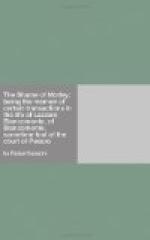When the seneschal had shown me to the quarters he had set apart for me, I made bold to make inquiries concerning Madonna Paola.
“She is in the garden, Illustrious,” answered the seneschal, deeming me, no doubt, a great lord, from the respect which Filippo had indicated should be shown me. “Madonna has the wisdom to seek the little sunshine the year still holds. Winter will be soon upon us.”
I agreed with the old man, and dismissed him. So soon as he was gone, I quitted my chamber, and all dust staineded as I was I made my way down to the garden. A turn in one of the boxwood-bordered alleys brought me suddenly face to face with Madonna Paola.
A moment we stood looking at each other, my heart swelling within me until I thought that it must burst. Then I advanced a step and sank on one knee before her.
“You sent for me, Madonna. I am here.” There was a pause, and when presently I looked up into her blessed face I saw a smile of infinite sorrow on her lips, blending oddly with the gladness that shone from her sweet eyes.
“You faithful one,” she murmured at last. “Dear Lazzaro, I did not look for you so soon.”
“Within an hour of your messenger’s arrival I was in the saddle, nor did I pause until I had reached the gates of Pesaro. I am here to serve you to the utmost of my power, Madonna, and the only doubt that assails me is that my power may be all too small for the service that you need.”
“Is its nature known to you?” she asked in wonder. Then, ere I had answered, she bade me rise, and with her own hand assisted me.
“I have guessed it,” answered I, “guided by such scraps of information as from your messenger I gleaned. It concerns, unless I err, the Lord Ignacio Borgia.”
“Your wits have lost nothing of their quickness,” she said, with a sad smile, “and I doubt me you know all.”
“The only thing I did not know your brother has just told me—that you are to be wed before Christmas. He has ordered me to write your epithalamium.”
She drew into step beside me, and we slowly paced the alley side by side, and, as we went, withered leaves overhead, and withered leaves to make a carpet for our fret, she told me in her own way more or less what I have set down, even to her brother’s self-seeking share in the transaction that she dubbed hideous and abhorrent.
She was little changed, this winsome lady in the time that was sped. She was in her twenty-first year, but in reality she seemed to me no older than she had been on that day when first I saw her arguing with her grooms upon the road to Cagli. And from this I reassured myself that she had not been fretted overmuch by the absence of the Lord Giovanni.
Presently she spoke of him and of her plighted word which her brother and those supple gentlemen of the House of Borgia were inducing her to dishonour.
“Once before, in a case almost identical, when all seemed lost, you came— as if Heaven directed—to my rescue. This it is that gives me confidence in such aid as you might lend me now.”




